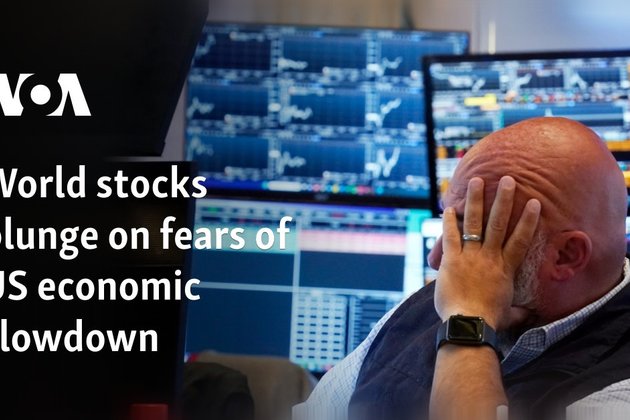https://www.europesun.com/news/274482908/world-stocks-plunge-on-fears-of-us-economic-slowdown

New York - Stock markets across the globe plunged Monday as investors sold stocks on worries that the U.S. economy, the world’s largest, might be slowing and possibly headed to a recession.
In afternoon trading, all three major U.S. indexes - the Dow Jones Industrial Average of 30 blue chip stocks, the broader S&P 500 index and the tech-heavy NASDAQ - were still down more than 2% after sustaining even steeper declines earlier in the day.
In Europe, the Pan-European Stoxx 600 index fell 1.5%, rallying from a larger dip earlier in the day, as every major market in Europe declined. The FTSE 100, Britain’s benchmark index, dipped just over 2%, its worst day since July 2023.
The sell-off started in Japan, with the Nikkei 225 index suffering its largest single-day point drop in history, ending the day down a staggering 12.4% - drawing comparisons to the “Black Monday” stock market crash of 1987. Other Asian markets also fell.
Monday’s sell-off began last week after a monthly U.S. jobs report showed significantly slower hiring, with 114,000 new jobs in July, far fewer than had been forecasted and sharply down from recent months. Unemployment rose to 4.3%, its highest level in nearly three years.
Specialist Glenn Carell works at his post on the floor of the New York Stock Exchange, Aug. 5, 2024.
The two pieces of data spooked investors, deepening fears that the U.S. economy could be sliding into a recession and that the Federal Reserve may have waited too long to cut its benchmark rate. It has delayed any rate cut until September, when the central bank’s policy makers are expected to trim the key rate that sets the standard for interest charges on many business and consumer loans.
The Fed last week held its benchmark rate at a two-decade high, where it has remained for a year.
In a new assessment, the Goldman Sachs investment company said it now expects the Federal Reserve to cut rates at its next three meetings - in September, November and December. Goldman raised its forecast for the probability of a U.S. recession in the next 12 months from 15% to 25%.
Because it encompasses 500 stocks, Standard & Poor’s index is often considered a key barometer of the U.S. economy. It has fallen sharply in recent days, but it is still up about 9% percent for the year. At its peak in mid-July, it was up 19%.
Trading in Japan was suspended to prevent panic selling after the decline triggered circuit breakers designed to contain severe market drops. The frenzy also activated circuit breakers in South Korea, where the main market finished nearly 9% lower.
In Taiwan, stocks plunged more than 8% - the worst single-day percentage drop in the island’s history. Shares of Taiwan Semiconductor Manufacturing Company - the world’s largest chipmaker - fell nearly 10%.
Employees look on the monitors displaying Japan’s Nikkei share average, which has had a record breaking-drop in the closing price, at Nagoya Stock Exchange in Nagoya, Japan, Aug. 5, 2024. (Kyodo via Reuters)
Aside from fears about the U.S. economy, geopolitical tensions frequently draw concerns for investors, too, including last week’s assassination in Iran of Ismail Haniyeh, Hamas’ top political leader. Iran has blamed Israel for the attack, and vowed retaliation, raising fears of a regional war.
The market plunge has been most severe in Japan, which analysts said was experiencing a market correction after many investors relied on a historically cheap yen and rock-bottom interest rates to fund risky investments. That strategy was exposed after Japan last week raised benchmark interest rates for only the second time in 17 years and hinted that such rate hikes may continue.
“I don’t think it’s a civilization-altering crash,” said Khoon Goh, head of Asia research at ANZ. “It’s just to me a simple case of market participants getting way ahead and, I guess you can argue, greedy, in over-leveraging, thinking that cheap and free money in Japan was going to be here to stay. And that has gone badly wrong, and they are having to very quickly unwind it and it’s having knock-on effects into asset markets.”
In an interview with VOA, Goh downplayed concerns about a U.S. recession.
“I think it’s a little bit unfair to blame the (U.S.) Fed for being late or behind the curve, because until recently a lot of people were thinking that the U.S. economy was still in reasonably good shape. And no one was really ringing the recession alarm bells,” he said.
Two years ago, the Fed started increasing borrowing costs to curb inflation, which had caused prices to soar for essentials like rent and food. Since then, it has aimed for a ‘soft landing,’ seeking to control inflation without causing an economic recession.
In a commentary published Monday, BMI - A Fitch Solutions Company, said, “The Fed has significant fire power and can cut rates quite aggressively to support growth if needed.”
BMI said that while global markets have been more volatile than expected, they had recently rallied sharply and were vulnerable to a sell-off.
“Corrections of 5-10% are fairly common during bull markets and typically, there is a seasonal pick up in equity volatility during the July-October period,” it added.
[Collection]europesun.com